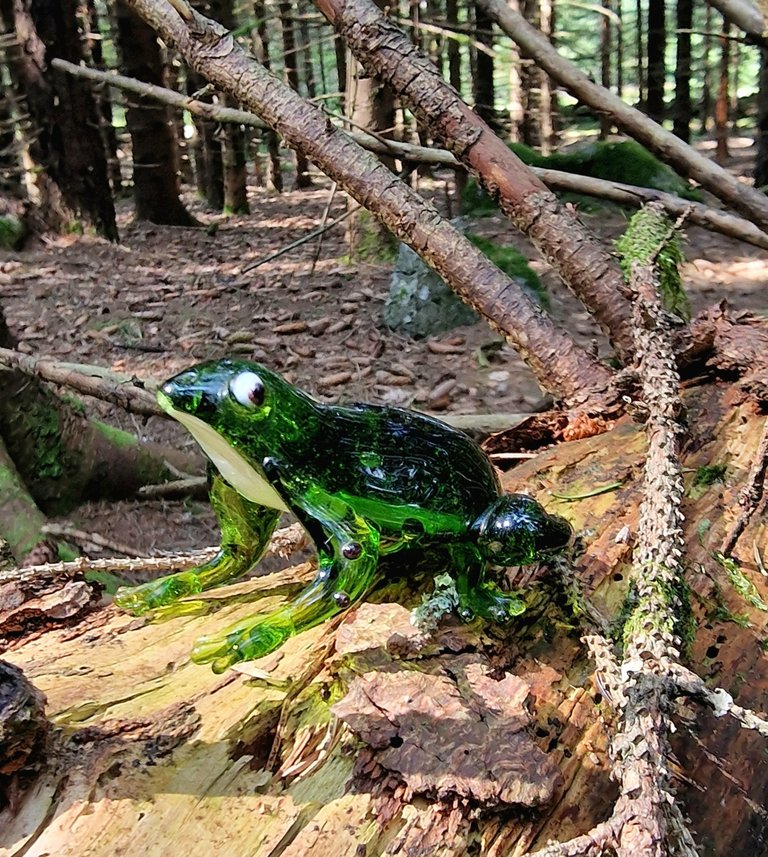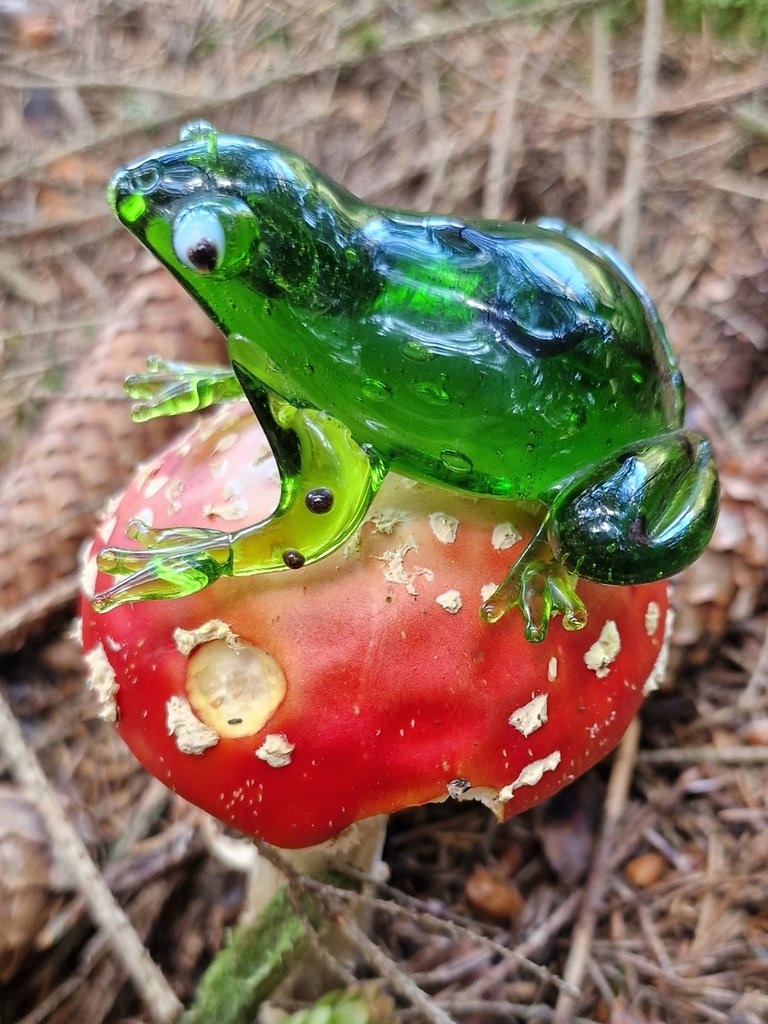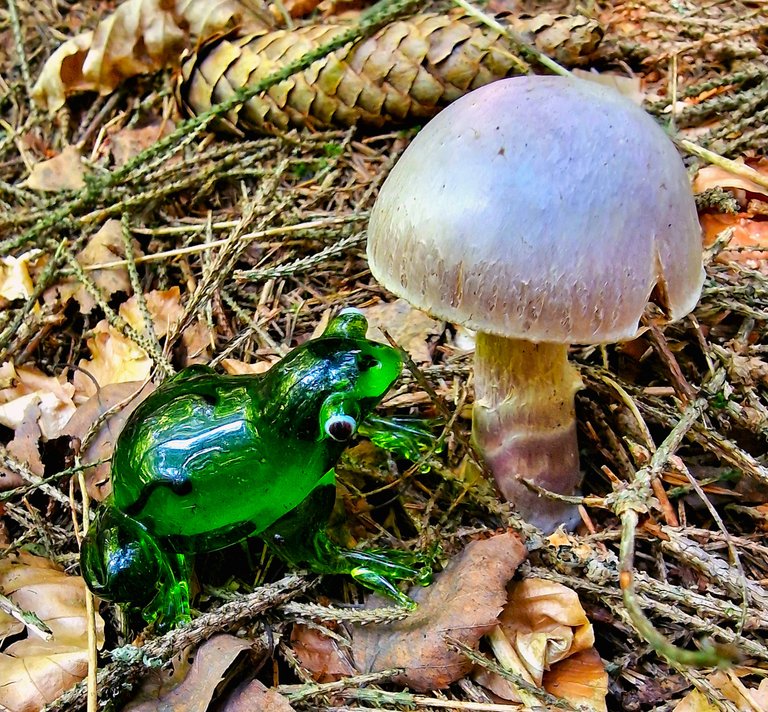this is my contribution to #FungiFriday by @ewkaw and also my entry to qurator photo quest: amphibians
 August has arrived so we are in the prime fungi season here. i was very hopeful of striking gold with chanterelles so we invited our friend Froggy to join me. though primarily aquatic, she loves to come along on walks in the forest and has become an expert at locating fungi on the forest floor
August has arrived so we are in the prime fungi season here. i was very hopeful of striking gold with chanterelles so we invited our friend Froggy to join me. though primarily aquatic, she loves to come along on walks in the forest and has become an expert at locating fungi on the forest floor
 right off the bat she hopped up on one i presume to be a Russula vinosa darkening brittlegill since we are in a conifer forest. if correct this is an excellent start, a very tasty find. there is an issue though. it is easy enough to determine if it is a brittlegill by peeling back the 'skin' of the cap. if the gills and stipe are white with no ring or volva and the skin peels easily it is a brittlegill. however several similar looking brittlegills are poisonous, particularly Russula emetica the vomiting russula or putting it bluntly The Sickener.
right off the bat she hopped up on one i presume to be a Russula vinosa darkening brittlegill since we are in a conifer forest. if correct this is an excellent start, a very tasty find. there is an issue though. it is easy enough to determine if it is a brittlegill by peeling back the 'skin' of the cap. if the gills and stipe are white with no ring or volva and the skin peels easily it is a brittlegill. however several similar looking brittlegills are poisonous, particularly Russula emetica the vomiting russula or putting it bluntly The Sickener.
to be certain it is necessary to take a tiny piece and taste it. if mild then you are good to go but if bitter then better luck next time. spit it out and you won't get sick but the taste is so bad you may do like me and refrain from testing any ever again and opt to search for other less problematic fungi. another option is to collect them to use as dye, the color it gives is a wonderfully earthy red.
speaking of red
 Froggy found a fantastic specimen of Amanita rubescens blushing amanita or blusher as they are often called in english because they turn red when bruised or cut. it looks a lot like a few toxic amanitas, especially the much less common but deadly Amanita pantherina. that may put you off but if the flesh reddens when exposed to air you have a blusher.
Froggy found a fantastic specimen of Amanita rubescens blushing amanita or blusher as they are often called in english because they turn red when bruised or cut. it looks a lot like a few toxic amanitas, especially the much less common but deadly Amanita pantherina. that may put you off but if the flesh reddens when exposed to air you have a blusher.
 notice the reddened areas along the broken edges. this is a common, edible and delicious mushroom but nevertheless, if Froggy ate it raw she might croak. so if you are tempted to try this be sure to cook it properly. all in all it is not one for beginners
notice the reddened areas along the broken edges. this is a common, edible and delicious mushroom but nevertheless, if Froggy ate it raw she might croak. so if you are tempted to try this be sure to cook it properly. all in all it is not one for beginners
 Amanita muscaria fly agaric is easy to distinguish with its bright red color. some claim it is edible some claim it is mildly hallucinogenic. some say it repels insects but Froggy insists it attracts them with its intoxicating properties. so this is her favorite toadstool, or rather frogstool to perch upon awaiting an unsuspecting victim in search of a fix...
Amanita muscaria fly agaric is easy to distinguish with its bright red color. some claim it is edible some claim it is mildly hallucinogenic. some say it repels insects but Froggy insists it attracts them with its intoxicating properties. so this is her favorite toadstool, or rather frogstool to perch upon awaiting an unsuspecting victim in search of a fix...
 next Froggy spotted some Cantharellus tubaeformis Trumpet Chanterelle or yellowlegs. it's early in the season for them
next Froggy spotted some Cantharellus tubaeformis Trumpet Chanterelle or yellowlegs. it's early in the season for them
 so most were too young to pick.as you can see they often grow in clusters so while even when mature there is not much food in a single one but where there is one there are certainly many more nearby. with their funnellike shape and irregular yellow stipe they are easy to identify and very tasty
so most were too young to pick.as you can see they often grow in clusters so while even when mature there is not much food in a single one but where there is one there are certainly many more nearby. with their funnellike shape and irregular yellow stipe they are easy to identify and very tasty
 but many, including Froggy prefer their better known cousins Cantharellus cibarius golden chanterelles. personally these are not my first choice but they are easy to spot, more massive and can sometimes be found in huge numbers. there is no denying the thrill of striking gold for the first time in a new area of the forest. we know this is a good area but sad to say, somebody beat us to it and had picked almost everything. however the season has just begun and can last until november so we will be back in the autumn after a rainy spell
but many, including Froggy prefer their better known cousins Cantharellus cibarius golden chanterelles. personally these are not my first choice but they are easy to spot, more massive and can sometimes be found in huge numbers. there is no denying the thrill of striking gold for the first time in a new area of the forest. we know this is a good area but sad to say, somebody beat us to it and had picked almost everything. however the season has just begun and can last until november so we will be back in the autumn after a rainy spell
 what have you found there Froggy? i can't see them properly
what have you found there Froggy? i can't see them properly
 that's better. some kind of cortinarius, probably Cortinarius traganus lilac conifer cortinarius. the ones that are a rusty brown color inside. not exactly edible but if i was starving and boiled them for a long time i may not get too sick. Froggy could probably handle them with no problem though. they can't taste much worse than flies. anyway they are handsome, standing tall with that silky white frosting on the lilac cap.
that's better. some kind of cortinarius, probably Cortinarius traganus lilac conifer cortinarius. the ones that are a rusty brown color inside. not exactly edible but if i was starving and boiled them for a long time i may not get too sick. Froggy could probably handle them with no problem though. they can't taste much worse than flies. anyway they are handsome, standing tall with that silky white frosting on the lilac cap.
 Tapinella atrotomentosa Velvet Rollrim is another handsome species, unmistakable with the velvety cap and dense black haired stem. the latin name basically means a black haired carpet. the cap has an irregular shaped but a smoothly rolled rim. so there should be no problem identifying this distinct sort. still, even though they have gills they are classified as if they had pores. i wonder what that is all about.
Tapinella atrotomentosa Velvet Rollrim is another handsome species, unmistakable with the velvety cap and dense black haired stem. the latin name basically means a black haired carpet. the cap has an irregular shaped but a smoothly rolled rim. so there should be no problem identifying this distinct sort. still, even though they have gills they are classified as if they had pores. i wonder what that is all about.
 oh come on Froggy. i can't identify every single fungi we find. we have enough now and whatever those are they are not edible so let's go. i'm hungry
oh come on Froggy. i can't identify every single fungi we find. we have enough now and whatever those are they are not edible so let's go. i'm hungry


